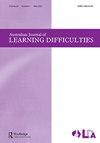To what extent does children’s spelling improve as a result of learning words with the look, say, cover, write, check, fix strategy compared with phonological spelling strategies?
IF 0.9
Q3 EDUCATION, SPECIAL
引用次数: 9
Abstract
Abstract The ubiquitous weekly spelling test assumes that words are best learned by memorisation and testing but is this the best way? This study compared two well-known approaches to spelling instruction, the rule based and visual memory approaches. A group of 55 seven-year-olds in two Year 3 classrooms was taught spelling in small groups for three lessons a week, 20-min per lesson, over ten weeks. In the first intervention, students learned statistically likely spelling strategies for vowel sounds, syllable breaking strategies, and the doubling rule. In the second intervention, students used a look, say, cover, write, check, fix strategy, listed words in alphabetical order, and wrote them in sentences. The control group completed non-spelling activities. Results showed that although both intervention groups learned to spell taught words better than the control group, the rule-based approach had greater transfer to spelling of new words for both proficient and less proficient spellers.与语音拼写策略相比,采用“看、说、盖、写、检查、固定”策略学习单词能在多大程度上提高儿童的拼写水平?
摘要无处不在的每周拼写测试假设单词最好通过记忆和测试来学习,但这是最好的方法吗?本研究比较了两种众所周知的拼写教学方法,即基于规则的方法和视觉记忆方法。在两个三年级的教室里,55名七岁的孩子被分成小组,每周上三节课,每节课20分钟,为期十周。在第一次干预中,学生们学习了元音的统计可能拼写策略、断音节策略和加倍规则。在第二次干预中,学生们使用了看、说、盖、写、检查、修复策略,按字母顺序列出单词,并将其写成句子。对照组完成了非拼写活动。结果表明,尽管两个干预组都比对照组更好地学会了拼写所教单词,但对于熟练和不熟练的拼写者来说,基于规则的方法在拼写新词方面有更大的转移。
本文章由计算机程序翻译,如有差异,请以英文原文为准。
求助全文
约1分钟内获得全文
求助全文
来源期刊

Australian Journal of Learning Difficulties
EDUCATION, SPECIAL-
CiteScore
1.80
自引率
11.10%
发文量
8
 求助内容:
求助内容: 应助结果提醒方式:
应助结果提醒方式:


